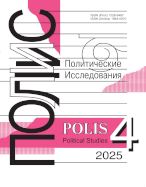Between Clinton and Bush, or How Is World Politics to be Taught?
Barabanov O.N.,
Professor, Professor of the RAS, Academic Director of the European Studies Institute, MGIMO University; Program Director, Valdai Discussion Club, drolegbarabanov@gmail.com
DOI: 10.17976/jpps/2004.06.21
Barabanov O.N. Between Clinton and Bush, or How Is World Politics to be Taught? – Polis. Political Studies. 2004. No. 6. https://doi.org/10.17976/jpps/2004.06.21
To proceed with the discussion that began in the previous issue, of development of world politics as a scientific and an educational discipline and of its correlation with other spheres of political science knowledge, the author gives an account of his view of this problem. In his opinion, world politics, in order to exceed the bounds of liberalism and to become ideologically neutral “world political science”, must “acquire history”. Only in that case, he supposes, will world politics be able to recast and to deideologize its system, turning it into “Global Political Science” within which it will be possible to single out chapters about world political culture, about forms of power relations on the planet, about authoritarianism and democratianism, about bureaucracy and civil society, — and thus to really extrapolate respective sections of political science to the level of integral political system of the world.
See also:
Chestneyshin N.V.,
Conservatism and Liberalism: Identity and Distinction. – Polis. Political Studies. 2006. No4
Vasilyev M.I.,
Parties, Movements, Political Forces. An Essay of Deconstruction. – Polis. Political Studies. 1992. No6
Pankova T.V., Skorik A.P.,
CD-Provincial (A Hislorical Essay on Constitutional Democrats' Politics). – Polis. Political Studies. 1993. No5
Mamayev Sh.,
Russia - USA: Is Partnership Premature?. – Polis. Political Studies. 1995. No6
Sergunin A.A.,
Problems and Possibilities of Regional Studies. – Polis. Political Studies. 1994. No5





.jpg)






 print
print
.jpg)
.jpg)